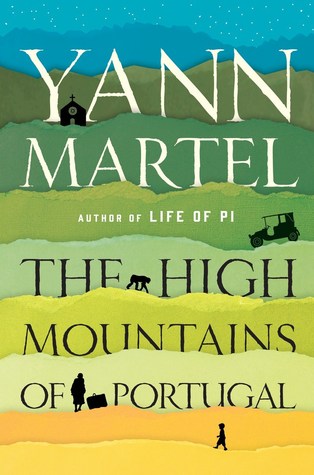 So, I think Yann Martel is best known for the other book toted on the cover of this one: Life of Pi. I read Life of Pi a while back, and while I liked the story, I didn't like the religion floating about in the background. For a while, I thought that was going to be the case with The High Mountains of Portugal, too. Once I realized that the title was actually Portugal, and not Peru. For some reason I kept reading this as Peru. I am well aware that Portugal and Peru are not the same country, but the "mountains" snapped in my mind as Peru, because I didn't think Portugal had mountains. And guess what? It doesn't. But when I opened the book and it started in Lisbon, I was very confused, because I didn't know why we were in Portugal when I thought we were supposed to be in Peru. Oooooops. My bad.
So, I think Yann Martel is best known for the other book toted on the cover of this one: Life of Pi. I read Life of Pi a while back, and while I liked the story, I didn't like the religion floating about in the background. For a while, I thought that was going to be the case with The High Mountains of Portugal, too. Once I realized that the title was actually Portugal, and not Peru. For some reason I kept reading this as Peru. I am well aware that Portugal and Peru are not the same country, but the "mountains" snapped in my mind as Peru, because I didn't think Portugal had mountains. And guess what? It doesn't. But when I opened the book and it started in Lisbon, I was very confused, because I didn't know why we were in Portugal when I thought we were supposed to be in Peru. Oooooops. My bad.That said, I think about exactly half of this book is good.
The book is divided into three parts taking place in different time periods, but which are all linked together by a town in the High Mountains of Portugal. The first part follows a young man who has recently lost his lover and their son. Left with nothing but his career at a museum, he sets out for the High Mountains (which are really more of a desert-like plateau) to recover a unique crucifix he's read about in the diaries of a priest (also the crucifix's creator) who spent time in Angola and Sao Tome tending to the spiritual needs of slaves. Unfortunately, this part of the book focuses mainly around driving. At first, Tomas' attempts to work his uncle's brand-new automobile, complete with elephant ear mudflaps, are amusing. But when he's still driving pages upon pages upon pages later, with not much changing at all... It was interminably boring, and while the discovery at the end of this first part was mildly interesting, it didn't justify the monotonous agony that went before it.
The second part was half-and-half. It starts out with a long, long treatise from the main character (of this part's) wife about finding God in Agatha Christie novels. Quite frankly, I don't care. The second half, dealing with the autopsy of a man who is carried into the main character's pathology department in a suitcase, took a turn for the surreal, and suddenly there's a question of reliability. Is the main character, whose name I can't remember, a reliable narrator or not? There's definitely a weird element to this, and a ghostly one, and those parts were much more interesting.
Finally, the third part of the book deals with a Canadian senator who adopts a chimpanzee while on a trip to the US, and moves to Portugal. I liked this part of the book, but probably more because it was a "new pet" story than anything else. And I liked the end here, with the revelation of something that everyone had thought was gone.
Like Life of Pi, there's this religious aspect running all throughout the book. Not being religious, I didn't get this and I consequently didn't like it. I thought there were some good atmospheric and story elements here, and that the second half was better than the first, but overall not a book I would recommend. The seemingly endless start combined with the rambling about religion in Agatha Christie in the second part were just roadblocks that I don't think the better elements ever really managed to recover from.
2 stars out of 5.
No comments:
Post a Comment